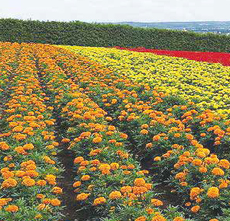 Ethiopia is known for its colourful and fragrant flowers, which it exports to the world. Its horticulture sector is the world’s fifth-largest. But it’s facing a major crisis due to the escalating violence in the northern Amhara region. The conflict, which pits federal troops against local militias, has disrupted the operations of many flower farms, threatening their productivity and profitability. Ethiopia’s flower industry generated over $650 million in revenue in 2022, according to the country’s horticulture association. The bulk of its exports are fresh-cut roses, which are in high demand for occasions like Christmas, and Valentine’s Day in Western countries. Last year, Ethiopia exported millions of kilograms of flowers to the European market during Valentine’s Day alone. The peak season for flower exports runs from December to June. But this year, it may be severely affected by the conflict in the Amhara region, which is home to many flower plantations.
Ethiopia is known for its colourful and fragrant flowers, which it exports to the world. Its horticulture sector is the world’s fifth-largest. But it’s facing a major crisis due to the escalating violence in the northern Amhara region. The conflict, which pits federal troops against local militias, has disrupted the operations of many flower farms, threatening their productivity and profitability. Ethiopia’s flower industry generated over $650 million in revenue in 2022, according to the country’s horticulture association. The bulk of its exports are fresh-cut roses, which are in high demand for occasions like Christmas, and Valentine’s Day in Western countries. Last year, Ethiopia exported millions of kilograms of flowers to the European market during Valentine’s Day alone. The peak season for flower exports runs from December to June. But this year, it may be severely affected by the conflict in the Amhara region, which is home to many flower plantations.
Violence has engulfed the Amhara region since August, when local militants launched a rebellion against the federal government, accusing it of marginalizing and oppressing the Amhara people. The federal troops have responded with a fierce crackdown, resulting in hundreds of deaths and thousands of displacements. The conflict has also disrupted the supply chains, transport networks, and security of the flower farms, forcing many of them to halt or reduce their activities. The Amhara regional government said it had lost up to $45 million, mostly from flower exports, alongside massive layoffs, since the start of the conflict.
The flower industry is one of the pillars of Ethiopia’s economy, and a key part of its Growth and Transformation Plan, which aims to make the country a middle-income economy by 2025. The plan involves attracting foreign investors and industries, such as European flower companies, by offering them incentives such as dutyfree access, loans, and subsidized electricity and water. The goal is to create jobs and reduce poverty for Ethiopians, who mostly rely on agriculture for their livelihoods.
The Ethiopian flower export business has witnessed a sharp growth in the last decade, with some of the world’s best flower companies operating farms across the country. These companies benefit from the favourable climate, fertile soil, and low-cost labour that Ethiopia offers. However, they also face various challenges, such as shortage of foreign currency, political instability, and human rights violations.
In the last three years, some of the leading foreign investors in meat and textile export businesses have exited Ethiopia due to these issues, as well as the country’s ejection from the Africa Growth Opportunity Act (AGOA), a trade pact with the United States that grants preferential access to African products. There is fear that the flower farmers might follow suit, especially if the conflict in the Amhara region persists or worsens.
Conflicts often throw vital economic sectors off balance, and Ethiopia has had an unhealthy dose in recent years. In 2016 and 2020, at the height of the political crisis and uprising against the government in Addis Ababa, several flower farms in the Oromia region were destroyed and forced to close shop temporarily. The Oromia region is another hotspot of ethnic tension and violence in Ethiopia, where the Oromo people, the largest ethnic group in the country, have been demanding more autonomy and representation. The Oromia region is also the primary source of Ethiopia’s coffee exports, another vital sector.
https://venturesafrica.com/
